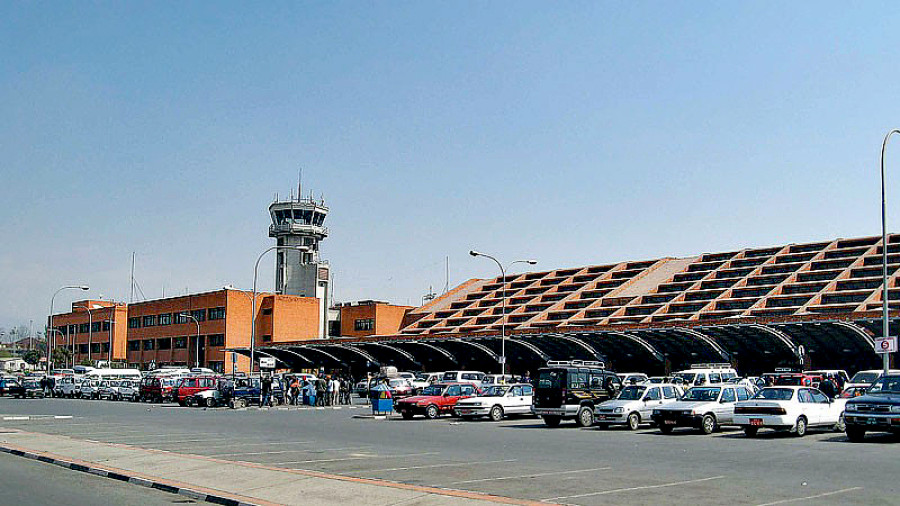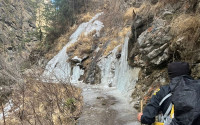National
Disease control division scans media reports to get information about disease outbreak
The health desk was set up to prevent the spread of Ebola Virus Disease in the country and other contagious diseases including severe acute respiratory syndrome (SARS), Middle East Respiratory Syndrome, coronavirus.
Arjun Poudel
Nine health workers were deployed at a health desk setup at the Tribhuvan International Airport some six years ago to carry out 24-hour screening of passengers entering the country.
The health desk was set up to prevent the spread of Ebola Virus Disease in the country and other contagious diseases including severe acute respiratory syndrome (SARS), Middle East Respiratory Syndrome, coronavirus.
The health desk was set up as per the instructions of the World Health Organization following an outbreak of Ebola Virus Disease in Guinea, Liberia, Sierra Leone, Democratic Republic of the Congo among other West African countries, where hundreds of Nepali security personnel have been deployed on peacekeeping missions.
Ebola is a deadly viral disease which spreads to people through direct contact with bodily fluids of infected people. As the virus spreads through the body, it damages the immune system and organs. Ultimately, it causes levels of blood-clotting cells to drop. This leads to severe, uncontrollable bleeding.
The disease was known as Ebola hemorrhagic fever but is now referred to as Ebola virus. It kills up to 90 percent of those infected.
Today, there are only four health workers serving at the health desk at the airport since the others have been transferred to the health facilities at the local levels. Due to lack of staff, the health desk stopped screening foreign passenger entering the country via the country’s sole international airport, round the clock.
Public health experts say that the risk of spread of contagious viral diseases—Ebola Virus Disease and others—is still high, more so, since hundreds of security personnel and officers of Nepal Army, and Armed Police Force and Nepal Police are still serving in the disease-hit countries.
Over 800 Nepal Army personnel are on a peacekeeping mission in Democratic Republic of Congo upon the request of the United Nation, where over 1,000 people infected from Ebola Virus Disease died in the last nine months.
Brigadier General Bigyan Dev Pandey, spokesperson fo Nepal Army, said that the Army used to quarantine its officials and personnel returning from the Ebola-hit countries for five weeks in the past but stopped after the risk of the infection showed a decline.
“Our personnel and officers are stationed away from the disease-hit areas,” Pandey told the Post, “Our medical team remains with the personnel and issues instructions as per the risk assessment.”
He said that the UN would also issue alert to the Army as per the risk assessment.
Likewise, a number of people serving in disease-hit African countries have risen in significant numbers in the last few years, according to Epidemiology and Disease Control Division under the Department of Health Services.
Dr Bibek Kumar Lal, director at the division, said, “We are unable to run the health desk round the clock. We tried a lot to run the health desk at the Tribhuvan International Airport effectively but could not convince officials at the Ministry of Health and Population.”
Apart from the Tribhuvan International Airport, the division had also set up health desks at eight international border check posts. However, none of them function properly due to lack of health workers and infrastructure.
Lal said that he tried to convince the officials at the Health Ministry to create a permanent position for health workers to be deployed at the health desks in the local units and at health desks at international borders but to no avail. “I also requested them to not transfer experienced health staff deployed at the health desk at the airport but no one listened to me,” said.
The division, which is responsible to contain disease outbreaks throughout the country, said that most of its channels had become non-operational, after the implementation of federalism.
The EDCD said that it had activated its remaining channel only after reports about recent outbreak of diarrheal disease in Gulmi and mysterious disease in Humla district.
“Instead of screening suspicious patients, we are limited to screening media reports,” said Dr Lal. “To be dependent on media report to get information about disease outbreak is not a good sign."




 22.26°C Kathmandu
22.26°C Kathmandu













